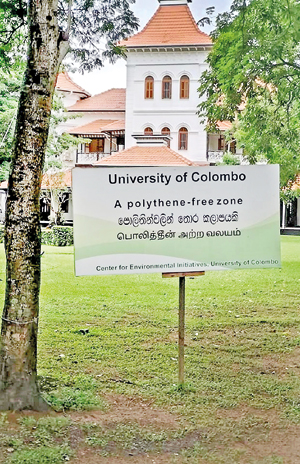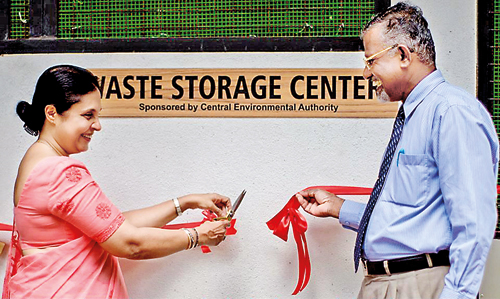Colombo Uni’s green revolution

Colombo University: Showing the way to a greener future
Heavily into preventing the pollution of the environment, they looked inward and around and decided to do their bit in managing their surroundings.
Now with a cheque for over Rs. 20,000 for the first segregated waste-load, their efforts have paid off with the pathway clearly set to bring about a ‘green’ University of Colombo.
The expertise is there for sure for the university’s Director for Environmental Initiatives, Prof. Erandathie Lokupitiya, is a specialist in climate change and lectures on environmental science.
The story unveils how the greening of the main campus of the university off Thurstan Road blossomed.
Prof. Lokupitiya and some students had gone walkabout in the campus in 2016 and found among the urgent environmental issues that needed to be sorted out, the canteens where hundreds of students had their meals. They decided to start with waste management.
Before them in 2014, the Faculty of Science had calculated the ‘carbon footprint’ and over time reduced it through electricity-related emissions by the use of LED lights instead of normal bulbs.
The carbon footprint is the total amount of greenhouse gases (including carbon dioxide and methane) that are generated by the actions of people and institutions which spur climate change.
“Methane emissions from waste at landfills in Sri Lanka are very high as there is no proper waste management system and anaerobic decomposition releases this gas into the air,” explains Prof. Lokupitiya, who had got activated in 2016 to seek the assistance of the Central Environmental Authority (CEA). They wanted to segregate the waste generated at the main campus.
Several discussions with the CEA’s Deputy Director-General of Waste Management, J.M.U. Indrarathne, resulted in the CEA promising to build the university a Waste Storage Centre.
With the CEA’s promise came the suggestion from then Vice Chancellor Senior Prof. Lakshman Dissanayake that the university should have a Centre for Environmental Initiatives (CEI) which saw the light of day in June 2017 based at College House with Prof. Lokupitiya as its Founding Director assisted by Madumi Kariyawasam.

Vice Chancellor Prof. Chandrika Wijeyaratne and CEA Deputy Director-General of Waste Management J.M.U. Indrarathne open the Waste Storage Centre
The CEI aims to establish a proper solid waste management system; protect the campus environment and make the premises more environment-friendly; and create environmental awareness among the university community and outside the university (schools).
“The data were disturbing. Sri Lanka generates 8,000-10,000 tons of waste per day and 50% of this solid waste generation per day occurs in the Colombo district. The University of Colombo generates 356,964 kg per year. While earlier 50%-60% of the waste was biodegradable, recent trends showed it to be non-biodegradable. This is why it is important to ‘know before you throw’ and resort to segregation,” points out Prof. Lokupitiya.
Bins were a necessity for segregation and MAS Active Linea Intimo readily supplied them to the university in 2017 in answer to their appeal.
The first step was to make the main campus polythene-free, says Prof. Lokupitiya, appreciating the support extended by the canteen staff. The five canteens were a hotbed where over a million single-use lunch sheets were discarded per year!
“It was hard, very hard at first,” she smiles, but her team persevered, creating awareness among the academics, non-academics and students.

Prof. Erandathie Lokupitiya
Use a plate, rinse it after eating and hand back to the canteen staff or bring your lunch in a box, they told all those who gave ear to them. Cut out polythene and use glass bottles and cloth bags, they urged. They held Green Talks, put up wooden plaques around the campus giving gentle reminders about the environment and everyone’s responsibility……and gradually came “a big change”.
This was after an initial disappointment in 2017-18 with a reduction target of around 40% but achievement only of around 25% as another challenge arose – polythene being brought from outside including the packets of lunch sold by street vendors just beyond the gates.
However, the last waste survey conducted within the main campus found that plastic/polythene waste generation has dropped by nearly 50% between 2018 and 2019, says Prof. Lokupitiya, explaining that they may be the only university where an annual waste survey is conducted with more than 30 students fanning out across all faculties, measuring waste types.
The survey covers biodegradable waste (food waste) and non-biodegradable waste (polythene/plastic & paper).
Referring to the total waste generation in 2017, 2018 and 2019, Prof. Lokupitiya says it was 351.84; 359.29; and 249.17 tons respectively. Although there was a slight increase in the total waste generation in 2018, the plastic/polythene and paper waste was less than in 2017. In 2018, polythene waste generation was reduced by 25% compared to 2017 and in 2019, it was down by 46%.
Bio-degradable waste is handed over to a piggery and yard waste is gradually being used as compost for the sprawling campus gardens.
The future is clear for the university – in addition to increasing greenery, solar-powered lights are to be introduced to new buildings along with water conservation through rainwater harvesting and vertical gardens. A tree audit by the Department of Plant Sciences is on the cards as also a compost yard by the Arts Faculty with all other faculties hoping to following suit. All these measures would pave the way for the university to become carbon neutral.
With the first waste-to-value project cheque in hand from the waste paper/plastic sold to Cleantech (Pvt.) Ltd., Prof. Lokupitiya and her team are happy “overall”.
The CEI is appreciative of the strong support extended by the current VC Prof. Chandrika Wijeyaratne and the administrative staff and says thank you to the CEA, Nations Trust Bank (NTB) and Cleanco Lanka Ltd., for sponsoring the annual waste survey. The CEI has also partnered with Modern Pack Lanka (Pvt) Ltd., for a yoghurt cup recycling programme.
All these measures make it obvious that the University of Colombo stands on the threshold of a metamorphosis into a sustainable, green and carbon-neutral university.


